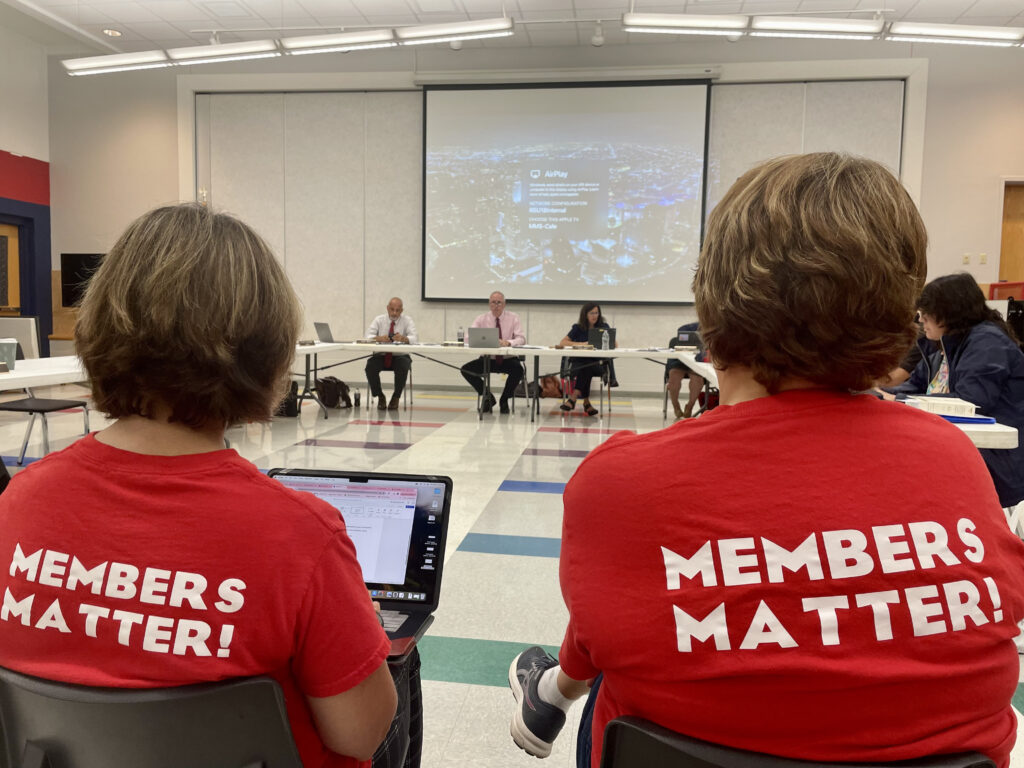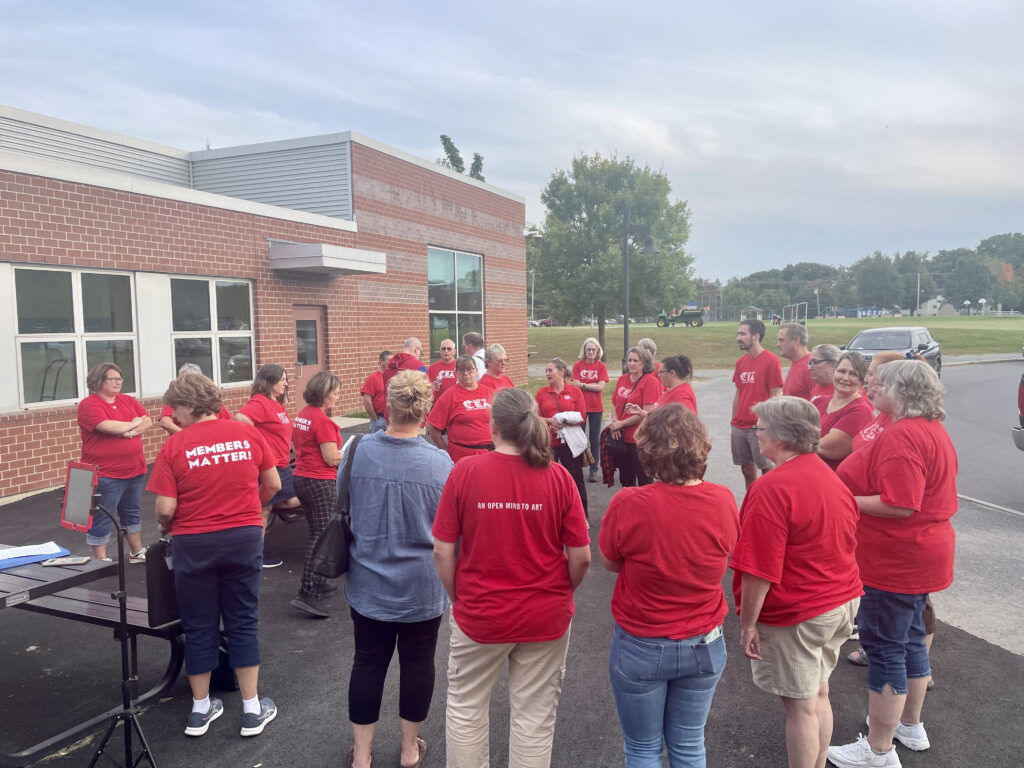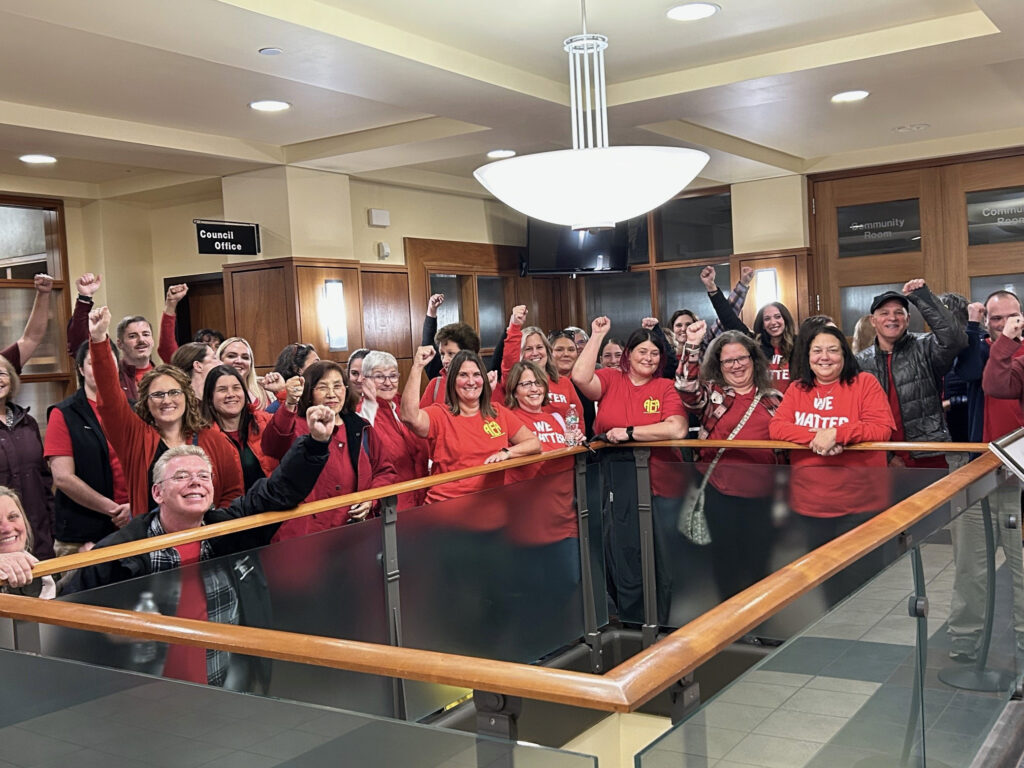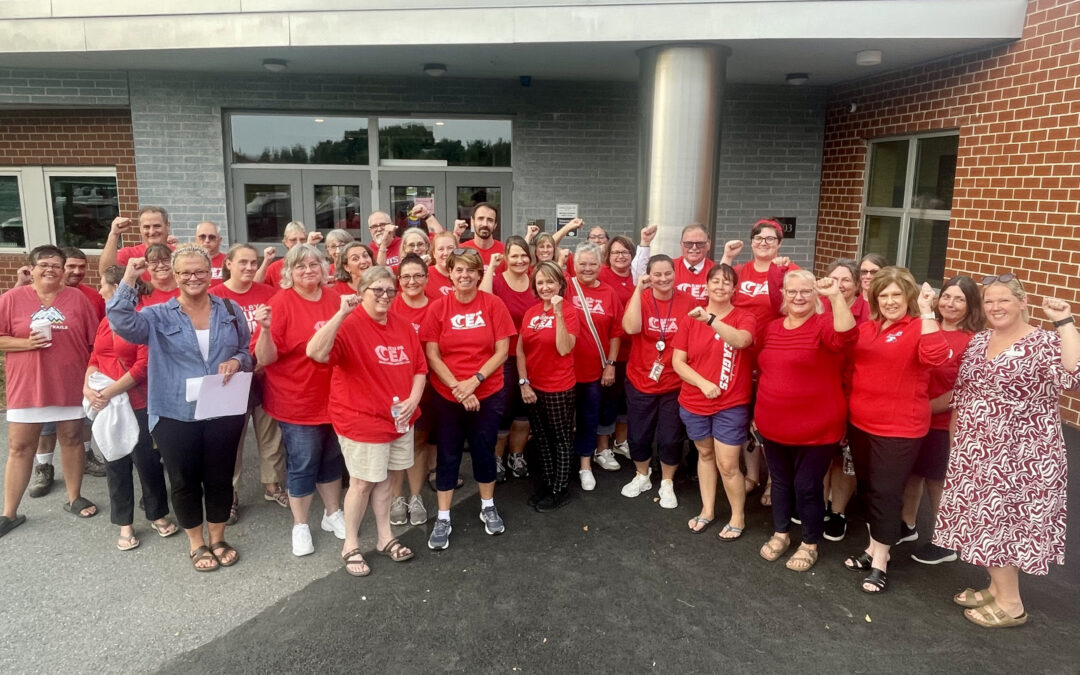Education support professionals (ESPs) across the state are organizing for a voice in their profession, demanding respect in the workplace, and advocating for appropriate staffing levels at their schools. Some ESP bargaining units spent the fall organizing to finalize their contracts, which in some cases, expired last year.
Through their efforts, they have successfully negotiated contracts that address key issues such as salaries, workplace conditions, benefits, and opportunities for professional growth. These gains not only improve the lives of the support staff but enhance the overall educational environment for students and teachers alike.
→ESPs at RSU 63 Settle First Contract
When James Spencer, an education technician in RSU 63, felt that he and his colleagues deserved more job security, he approached other ESPs in his district about starting a union.
“Last year I realized how much power the school board had, so I approached our UniServ Director, Anthony Feldpausch, about unionizing,” Spencer said. “I realized as an at-will employee, I couldn’t advocate for the better learning and working conditions that my students and colleagues deserve without the threat of losing my job.”
Eighty percent of education technicians at RSU 63 supported unionization. As a result, contract negotiations began last October. Their primary goal as a newly formed bargaining unit was to amplify their voices, gain respect from district administration, and increase job security.
Throughout the year-long bargaining process, key issues included adding just cause language to their contract, additional compensation for increased job responsibilities, health insurance premiums, retroactive pay for the 2024 school year, professional development, and wages.
Their hard work and persistence paid off. Their first contract—ratified in December—includes a 23.5% wage increase, just cause for dismissal and discipline, insurance benefits matching the teachers’ collective bargaining agreement, reimbursement for personal items broken on duty, and retroactive wages for the fall.
Perhaps the most notable aspect of the contract is the “Grow Your Own” program, which provides professional development funds for those seeking teacher certification. Through this program, the district identifies shortage areas and invests in employees looking to gain their teaching certification to fill the need.
“In the past year there had not been any professional development opportunities for ed techs in the district; it was important to us that ed techs have access to professional development opportunities to grow in the profession as well,” Spencer said.
I learned that our collective bargaining agreement holds the school board and administration accountable. It gives us protection to speak up when something isn’t being done properly in school, and advocate for our students.
James Spencer
Ed Tech, RSU 63
Already enrolled in graduate classes for the spring semester, Spencer is among the bargaining unit members who will benefit from the “Grow Your Own” program. “I am excited about this,” Spencer said. “It gives ed techs the opportunity to have the district invest in their career, while helping the district fill high need areas like special education.”
RSU 63 TA Treasurer Helen Allen-Welden, a member of the teachers’ bargaining unit, supported the ESPs during their first collective bargaining negotiation. She says the process helped her grow as a union leader and recommends others get involved.
“Supporting the ESP contract was a rewarding process,” she said. “It taught me a lot about bargaining and allowed me to develop relationships with the school board and within the district. I would 100% recommend other members run and represent their bargaining units. It is a time commitment but eye-opening,” Allen-Welden said.
Why is a seat at the table such a big deal? Bargaining ensures educators have a voice, and that voice can make a significant difference. As Allen-Welden puts it, “This will help our ESPs feel more valued and secure—that’s my hope. It should help us recruit more staff and invest in the amazing ESPs we have.”
For Spencer, collective bargaining has empowered him to advocate for both his colleagues and his students. “I learned that our collective bargaining agreement holds the school board and administration accountable,” he says. “It gives us protection to speak up when something isn’t being done properly in school, and advocate for our students.”


→RSU 18 Support Staff Organize for Better Pay and Paid Lunch Breaks
RSU 18 EA’s education support staff—including custodians, education technicians, and nutrition professionals—began this school year with an expired contract. The primary issues that united members during the contract negotiations, which settled in October, were the need to feel respected in their profession and to maintain their current workday schedule.
These dedicated professionals play crucial roles both inside and outside the classroom and deserve to be respected and recognized for their contributions.
nINETTE FENALSON
pRESIDENT, rsu 18 ea
When the administration suggested eliminating a paid lunch period to cover the cost of proposed wage increases—in some cases reducing the number of paid hours ESPs could work—members of the bargaining unit, staff, and community came together to show their support and respect for the district’s ESPs.
RSU 18 EA organized dozens of members to attend an October school board meeting, delivering a unified message: ESPs deserve to be treated with respect and should be compensated fairly for the crucial role they play in our school communities.
“These dedicated professionals play crucial roles both inside and outside the classroom and deserve to be respected and recognized for their contributions,” said Ninette Fenlason, RSU 18 EA President at the October meeting.

→Auburn EA Organizes Around Health Insurance and Higher Wages
When negotiations stalled this fall, 65 members of the Auburn Education Association (Auburn EA) packed a school board meeting dressed in red to show solidarity with the education technicians and secretaries in their bargaining unit. Their goal? To call on the school board to resume negotiations for a contract that expired on August 31st.
Throughout the fall, nearly 100 education technicians and secretaries in the bargaining unit organized around stagnant wages, limited health insurance coverage, and the frequent use of education technicians as substitute teachers.
The district’s initial proposal did not account for inflation, which the Auburn EA said made it difficult to attract and retain employees.
According to Warren Leunig, co-vice president of the Auburn EA, members of the bargaining unit make so little that they qualify for MaineCare and Supplemental Nutrition Assistance Program (SNAP) benefits.
After mediation in early November, the unit successfully secured a contract that includes significant wage increases and improved insurance coverage. The new contract also introduces bereavement leave and paid holidays, making substantial progress for the bargaining unit. However, dependent health care remains an out-of-pocket expense or a MaineCare option, highlighting ongoing challenges. Despite this, Leunig says he views these gains as crucial momentum for future negotiations.

→Portland EA Teachers and ESPs Work Together as a Team to Secure Ed Tech Contract
Jen Cooper’s teenage son was offered a summer job paying $20 per hour, a wage higher than some education technicians in Portland earned at the start of the school year.
Portland EA members gathered at a school board meeting this fall to testify that starting wages in the previous contract—which expired on August 31st—were not livable, leading to shortages in schools. “Starting this school year without a contract was disheartening,” said Portland EA ESP President Jen Cooper. “Our last contract was a year and a half overdue, which was difficult for morale.”
The Portland EA ESP bargaining unit represents 220 education technicians working in Maine’s largest school district. Cooper said the district was eager to raise wages, but only at the bottom of the wage scale, with the goal of attracting new educators to the district. However, Cooper and Portland EA members felt it was equally important to raise wages across all steps of the pay scale.
Together we can do so much more. If you have people in your building that aren’t members, talk about the benefits of joining the union because when you need them, there is strength in numbers, and belonging to the union is worth every penny.”
Jen Cooper
ESP President, Portland EA
“We wanted to not only attract new staff but also focus on retaining the amazing educators that we have in our district,” Cooper said.
Ultimately, Portland EA reached an agreement with the school board that increased the wages for education technicians by 12% while maintaining fully funded benefits. In addition, members gained an increase in substitute pay and ensured that staff are paid a full day’s wages on late start and early release days.
“As hourly employees, there was a week last year where staff lost a day of pay because of early releases and late arrivals attributed to weather. So being paid for a full day when school is released early is going to make a big difference for our ESPs,” Cooper said.
Portland EA—under the leadership of President Kerrie Dowdy and Cooper—has worked to bring both bargaining units together in support and solidarity. “The key point to our success,” Cooper explained, “was that the teachers and ed techs have truly come together as partners, which has had a positive impact on our bargaining success.”
“Together we can do so much more,” Cooper said. “If you have people in your building that aren’t members, talk about the benefits of joining the union because when you need them, there is strength in numbers, and belonging to the union is worth every penny.”
How to have Transformational Organizing Conversations in Your School:
- Together we have a stronger voice!
Joining adds your voice to thousands of educators just like us across the state and millions of educators across the country to accomplish things one educator, one bus driver, one janitor, or even one district can’t do alone.
As a union, we regularly meet with school administrators, school boards, and lawmakers from both major political parties to advocate for higher wages, better benefits, and improved working conditions for educators. - Together for our students!
Great educators create great public schools. Your union is here to help you get the training, tools, and community support you need to engage students, advance education justice, and excel in your profession. - Together for change!
When we speak up as part of our local union, we can advocate for significant changes like increased salaries or cost-of-living adjustments. Additionally, we have already secured improved health care benefits, comprehensive student loan forgiveness and repayment programs, and discounts on school-related items—things that improve our daily lives as educators.







